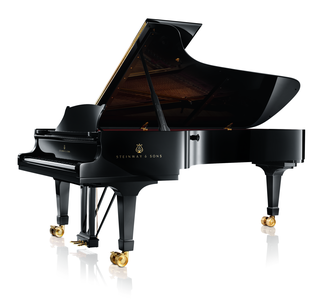
Steinway & Sons, also known as Steinway, is a German-American piano company, founded in 1853 in New York City by German piano builder Heinrich Engelhard Steinweg. The company's growth led to a move to a larger factory in New York, and later opening an additional factory in Hamburg, Germany. The New York factory, in the borough of Queens, supplies the Americas, and the factory in Hamburg supplies the rest of the world.

The Centennial International Exhibition, officially the International Exhibition of Arts, Manufactures, and Products of the Soil and Mine, was held in Philadelphia, Pennsylvania, from May 10 to November 10, 1876. It was the first official world's fair to be held in the United States and coincided with the centennial anniversary of the Declaration of Independence's adoption in Philadelphia on July 4, 1776.
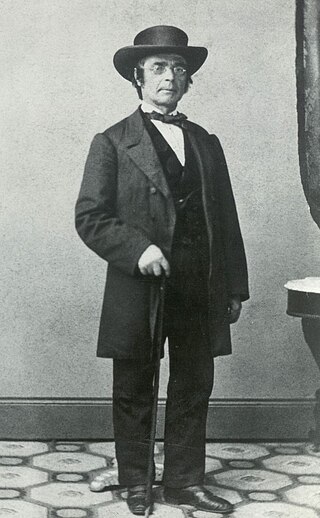
Heinrich Engelhard Steinweg, anglicized name Henry Engelhard Steinway, was a German-American piano maker who made pianos in both Germany and the United States. He was the founder of the piano company Steinway & Sons.

Mason & Hamlin is an American manufacturer of handcrafted grand and upright pianos, currently based in Haverhill, Massachusetts. Founded in 1854, it is one of two surviving American piano manufacturers from the "Golden Age" of pianos, although some smaller piano manufacturers have since started in the United States.
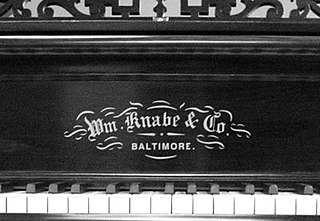
Wm. Knabe & Co. was a piano manufacturing company in Baltimore, Maryland, from the middle of the nineteenth century through the beginning of the 20th century, and continued as a division of Aeolian-American at East Rochester, New York, until 1982. The name is currently used for a line of pianos manufactured by Samick Musical Instruments.
Hardman Peck was a piano manufacturer established in New York City in 1842 by Hugh Hardman. Hugh's brother John joined the company in 1874, and Leopold Peck became a partner in 1890. In 1890 the name was changed to Hardman, Peck & Co. Hardman was considered one of the distinguished piano manufacturers of this era, with a worldwide reputation for the utmost in reliability. Hardman pianos were noted for their technical qualities, for their purity, delicacy, the artistic beauty of their cases, and for their remarkable durability. Hardman pianos were once the official piano of the Metropolitan Opera Company in New York.
Lindeman was a name used by a series of piano manufacturers in New York in the nineteenth and twentieth centuries. The concern was founded by William Lindeman (1794–1875) on a small scale in Dresden in about 1822, and reestablished by him in New York City in 1835 or 1836, where it grew to a medium size within twenty years. American piano historian Daniel Spillane credited him as one of the first successful immigrant German piano makers in the United States.
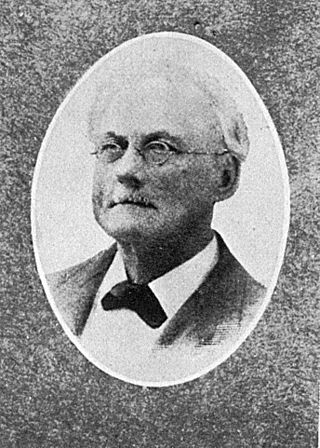
Frederick Mathushek was a piano maker who worked in Worms, Germany, and in New York City and New Haven, Connecticut, during the second half of the nineteenth century. His name was used by several different piano manufacturers through the 1950s, and was filed independently as a trademark for musical instruments in 2005 and 2008.

The Aeolian Company was a musical-instrument making firm whose products included player organs, pianos, sheet music, records and phonographs. Founded in 1887, it was at one point the world's largest such firm. During the mid 20th century, it surpassed Kimball to become the largest supplier of pianos in the United States, having contracts with Steinway & Sons to provide its Duo-Art system for installation in Steinway pianos. It went out of business in 1985.

Steck was a brand of pianos manufactured from 1857 to 1985. They were initially made by George Steck & Company before combining with the Aeolian Company in 1904. The Aeolian Company went bankrupt in 1985. The Steck piano brand was then sold to Sohmer & Co., and then to America Sejung Corporation, which dissolved in 2013.

Thomas Edward Chickering was a piano manufacturer and soldier.
Ludwig & Co., earlier Ludwig Pianos, was a piano manufacturer located at numbers 968–972 of what was then Southern Boulevard, between 135th and 136th Streets, Port Morris, Bronx, New York City at the turn of the 20th century.
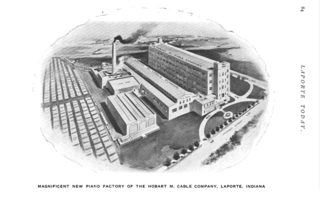
The Hobart M. Cable Co. is a defunct American piano manufacturer that operated from 1900 until the 1960s, mostly in La Porte, Indiana.
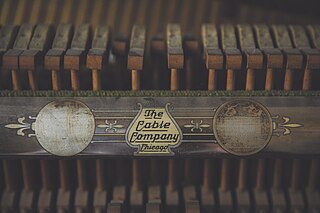
The Cable Company was an American manufacturer and distributor of pianos and reed organs that operated independently from 1880 to 1936.
The Weber Piano Company is a former piano manufacturing company based in New York City and East Rochester, New York from the middle of the 19th century through the beginning of the 20th century, and continued as a division of Aeolian-American at East Rochester, New York until 1985, when Aeolian went out of business.
The Sterling Piano Company was a piano manufacturer in Derby, Connecticut. The company was founded in 1873 by Charles A. Sterling as the Sterling Organ Company. Sterling had purchased the Birmingham Organ Company in 1871 and had $30,000 to fund the company. The Sterling Organ Company began making pianos in 1885. By the early 20th century the company had its headquarters in Brooklyn, New York, and operated factories in both Derby and Shelton, Connecticut.
Parker Bros was an American firearms firm, mostly producing shotguns from 1867 to 1942. During these years, approximately 242,000 guns were produced in various grades, and are widely considered the finest and most collectible American shotgun.

The Starr Piano Company was an American manufacturer of pianos from the late 1800s to the middle 1900s. Founded by James Starr, the company also made phonographs and records and was the parent company of the jazz label Gennett. The company is known for manufacturing pianos under the brand names of Starr, Trayser, Duchess, Richmond, Remington, and Royal.
Winter and Company was an American manufacturer of pianos. Founded in 1901 as Heller & Co. by cabinetmaker Gottlieb Heller, the firm was purchased and renamed in June 1901 by Julius Winter. In 1903, the company opened a factory on Southern Boulevard in The Bronx borough of New York City. In 1904, the company began to sell player pianos that used a "Master Player" mechanism of its own design.













